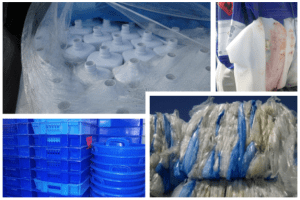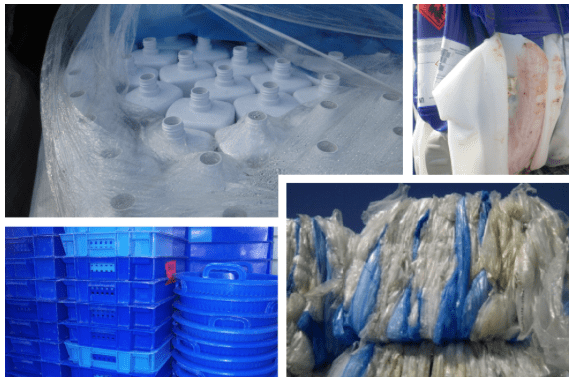 Two dominant messages emerged from the Cleaning & Hygiene Suppliers Association (CHSA) conference on plastics. First, products packaging and processes need to be designed with recycling in mind. Second, an integrated approach, from the start to the finish of the supply chain, is crucial if recycling is to be increased.
Two dominant messages emerged from the Cleaning & Hygiene Suppliers Association (CHSA) conference on plastics. First, products packaging and processes need to be designed with recycling in mind. Second, an integrated approach, from the start to the finish of the supply chain, is crucial if recycling is to be increased.
CHSA members, who are working hard to build environmental sustainability into the heart of their businesses, were addressed by a panel of experts.
The panel comprised: Martin Kersh, Executive Director of the Foodservice Packaging Association (FPA); Mark Roberts, Managing Director of Plasgran, a leading recycler of plastic waste in the UK and part of RPC bpi Group; Anthony Holley, Development Director of waste management company, Biffa and Richard Lainchbury, Operations Director at Bunzl Cleaning & Hygiene Supplies responsible for the company’s waste management strategy.
“Our members want to do the right thing in terms of environmental sustainability,” explained CHSA Chairman, Stephen Harrison. “Our expert speakers provided valuable information. As an Association we are taking it forward to develop a practical roadmap our members can follow to improve their processes and procedures as we work towards an efficient and environmentally-friendly circular economy.”
The perception plastic is suffocating the planet triggered a backlash, yet it is an incredibly versatile material, all types of which can be almost endlessly recycled with a carbon footprint lower than current alternatives. A predominantly circular plastic economy is possible, but product and packaging design can make it difficult to extract and recycle each type of plastic from the waste stream. In addition, consumers are confused about what is possible and what they need to do to facilitate recycling, often throwing plastic into general waste as a result. Educating people and businesses on the best practice for collecting, sorting and cleaning waste at source will boost recycling of plastic. An integrated supply chain, each element structured to facilitate recycling, will also make a significant positive impact.
Martin Kersh began by providing an update on legislation affecting business, urging delegates to engage actively in relevant consultations. “Your voices need to be heard,” he said, “if we are to reach a position where this valuable material is used in an environmentally sustainable way. In particular, ‘producer responsibility’ means the manufacturer is responsible for what ultimately happens to the plastic. If this is the case, a responsibility must also be placed on the consumer to dispose of the product correctly. Littering, for example, or a failure to provide access to appropriate recycling facilities must be properly addressed.”
Mark Roberts made clear the real challenge for recyclers is extracting plastic from the waste stream. “We have the technical expertise to recycle every type of plastic” he said. “The challenge is capturing it efficiently from the waste flow. The infra-red scanners, for example, cannot identify the type of plastic if it is black. Products designed with this in mind will radically change our rates of recycling.”
Anthony Holley, Development Director of Biffa, a leading waste management company, explained the imperative of collecting and sorting waste quickly and easily into individual waste streams if recycling rates are to increase. “There needs to be simpler and more consistent packaging at source, designed for recyclability and using more recycled content, together with clear and consistent labelling for consumers. This will feed into consistency at the collection end, reducing confusion about what can and can’t be recycled across the board. Personal responsibility is as important as producer responsibility.”
Finally, Richard Lainchbury, Operations Director at Bunzl Cleaning & Hygiene Supplies responsible for the company’s waste management strategy, explained how the company is segregating waste streams and adopting a plethora of small but impactful changes. “We have set a minimum standard for all our sites,” he said. “Each one has to have segregated waste streams in order to maximise recycling opportunities in the office and warehouses. All branches are reusing packaging and equipment to reduce reliance on plastics we are introducing water tape dispenser machines to remove polypropylene tape across our branches and trailing alternatives to pallet wrap. By adopting the mantra of reduce, reuse and recycle, small changes like these are having a big impact in our business.”




